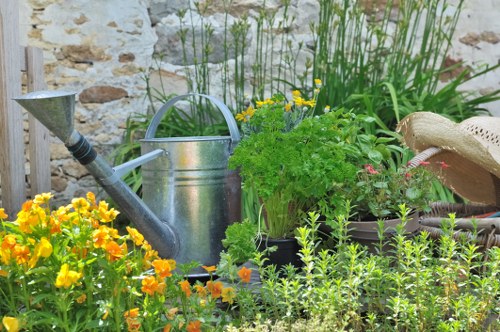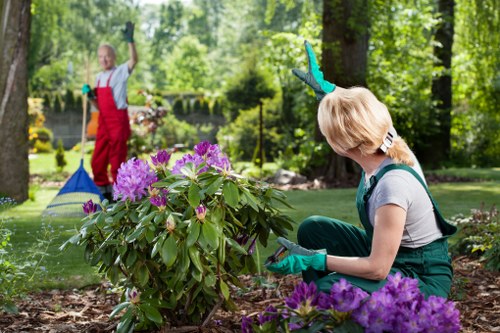Garden Maintenance Emerson Park: A Comprehensive Guide For Every Season

Gardening in Emerson Park is more than just an outdoor activity; it is a way of life that combines the beauty of nature with the practicality of home maintenance. When you invest time in garden maintenance in Emerson Park, you are investing in a space where fresh air, vibrant flowers, and healthy vegetables all create a sanctuary of peace. In this guide, we will explore every aspect of garden care – from daily routines to seasonal tasks – so that you can enjoy your outdoor space all year long. Our aim is to provide insights that are both practical and empathetic, understanding that every garden and gardener is unique, yet connected by the love of nature.
Living in Emerson Park means experiencing a diverse climate that challenges gardeners to adapt and thrive. Whether you are nurturing a colorful flower bed or maintaining a low-maintenance lawn, the principles of care remain constant. With the right techniques, tools, and a little creativity, any garden can transform into a personal oasis. This article will delve into various methods such as proper pruning, effective watering strategies, and innovative soil management. It is our hope that these tips inspire you to look at garden maintenance not as a chore, but as an opportunity for mindfulness and connection with the natural world.
Emerson Park gardens are more than just landscaped yards; they are dynamic ecosystems that require regular attention and care. Routine maintenance helps prevent overgrowth, encourages healthy plant development, and wards off pests naturally. By being proactive and informed about your garden's needs, you create an environment where not only plants but also native wildlife can flourish. Each tip provided in this guide is based on proven horticultural practices and is tailored to the specific needs of the Emerson Park environment. As you read through, remember that even small changes in your approach can lead to significant improvements in the overall health and beauty of your outdoor sanctuary.
Understanding Garden Maintenance Techniques and the Art of Horticulture

Effective garden maintenance is built on a foundation of understanding the unique characteristics of your outdoor space. In Emerson Park, where soils, sunlight, and microclimates vary even from one block to the next, gardeners thrive by combining traditional methods with modern innovations. By focusing on key practices such as careful pruning, balanced fertilization, and proper irrigation, homeowners can ensure that their gardens remain lush and vibrant. Remember that a well-maintained garden not only beautifies your home but also improves air quality and creates a habitat for beneficial insects. This guide explains these techniques with clear examples and step-by-step processes so that even the most novice gardener can become confident in their abilities.
Many gardeners in Emerson Park find that embracing both conventional and organic methods results in exceptional outcomes. Seasonal techniques are particularly important as they help optimize plant growth and reduce the need for chemical interventions. For example, early spring is the ideal time to enrich the soil with organic compost, while midsummer calls for consistent watering and mulching to retain moisture. In the fall, a combination of strategic pruning and the addition of winter mulch can prepare your garden for colder months. This thoughtful process ensures that the garden retains its vibrancy throughout the year. Integrated pest management and natural disease prevention further enhance these efforts, reducing reliance on synthetic chemicals and supporting a healthier ecosystem.
In addition to the basic upkeep techniques, there are several advanced strategies that Emerson Park gardeners use to ensure long-term success. Crop rotation is a key tactic, particularly for vegetable gardens, where alternating plant families can help maintain soil fertility and prevent the build-up of pests. Moreover, using organic amendments not only boosts nutrient content but also fosters a flourishing microbial community that improves soil structure. Every gardener will find it useful to maintain a garden journal, recording the successes and challenges of each season. These records serve as a valuable reference, helping you adjust your practices and better understand how local weather patterns and soil types interact with your garden’s specific needs.
Seasonal Garden Care in Emerson Park: Embracing Every Change

Gardening is inherently connected to the cycles of nature, and Emerson Park offers four distinct seasons that each bring their own set of challenges and rewards. In spring, the garden awakens with new growth, requiring careful planning for planting bulbs and early blooms. During this time, it is vital to start with a thorough inspection of the garden, remove any winter debris, and prepare the soil with a balanced mix of compost and organic matter. Embracing the natural rhythm of spring, this season is perfect for experimenting with new plant varieties and integrating native species that thrive in local conditions. In many instances, community workshops and local gardening clubs provide additional support and shared knowledge which can greatly enhance your gardening strategy.
Summer in Emerson Park brings intense sunlight and higher temperatures, necessitating a different set of maintenance practices. Water conservation becomes paramount as excessive heat can quickly dehydrate soil and stress plants. This is the time to introduce efficient irrigation systems such as drip irrigation, which deliver water directly to the plant roots. Mulching plays a dual role by helping to maintain soil moisture and keeping weeds in check. Gardeners should also schedule regular weeding sessions, as well as pay attention to signs of pest infestations which are common during hot weather. With the right balance of hydration and timely care, your garden can remain a lush oasis even during the peak of summer heat.
As autumn approaches, Emerson Park transforms into a canvas of changing colors, and garden maintenance must adapt accordingly. The fall season is an ideal time for pruning overgrown branches, removing spent plants, and preparing beds for the winter months. Autumn care often includes adding an extra layer of mulch to protect the soil from freezing temperatures and conserving moisture through the colder months. Regular cleanup routines help prevent the buildup of fallen debris, which can harbor pests and diseases. Additionally, many gardeners choose to plant cover crops during the late fall to enrich the soil. With calculated timing and careful attention, the transition from autumn to winter can be managed seamlessly, ensuring that the garden remains healthy and vibrant even during periods of dormancy.
Essential Tools, Equipment, and Eco-Friendly Practices for Lasting Garden Health

Having the right set of tools can greatly simplify the complexities of garden maintenance in Emerson Park. Essential equipment includes items such as pruning shears, trowels, rakes, and lawn mowers that make everyday tasks less burdensome and more efficient. For instance, a sturdy pair of pruners is indispensable for shaping shrubs and removing dead branches, while a reliable rake helps keep your garden free of debris. Modern tools often incorporate ergonomic designs to reduce strain and enhance productivity over long hours of work. Investing in quality equipment can lead to improved garden health and more enjoyable maintenance sessions, as each task is completed with precision and care.
Today’s environmentally conscious gardeners are increasingly turning to eco-friendly practices and sustainable tools that minimize environmental impact. Embracing organic fertilizers and non-toxic pest control measures is a hallmark of modern garden maintenance. In Emerson Park, many residents use composting methods to turn kitchen scraps and yard waste into valuable nutrients for their gardens. Rainwater harvesting systems, which capture and store rainwater for irrigation, are becoming a popular feature among eco-friendly homeowners. These practices not only contribute to environmental sustainability but also reduce water bills and improve the overall resilience of your garden. By taking small but significant steps towards sustainability, you enhance both your garden’s output and your personal well-being.
The benefits of eco-friendly garden practices extend far beyond environmental conservation. When using organic methods, gardeners often notice healthier soil structure, fewer chemical residues, and a boost in local biodiversity. Green gardening involves choosing native plants that require fewer chemicals, reducing overall maintenance costs and fostering a natural habitat for local wildlife. For those transitioning to these eco-friendly techniques, starting with a small section of the garden can be a manageable way to adapt. Over time, as you observe positive changes in plant vitality and soil health, you may find that sustainable gardening practices are not only good for the planet but also for your long-term garden goals. The journey towards an eco-friendly garden is both gratifying and practical, making it a trend that is set to continue in Emerson Park and beyond.
Local Garden Design, Pest Management, and Exploring Nearby Areas

Designing your garden in Emerson Park is a creative endeavor that combines aesthetics with functionality. Whether you prefer a modern minimalist layout or a lush, vibrant border of native flowers, the key to success lies in understanding the interplay between sunlight, soil type, and the natural topography of your property. A well-designed garden not only brings beauty to your home but also encourages a healthy environment where plants thrive. Many designers emphasize the importance of planning for both form and function, recommending features like winding pathways, strategically placed seating areas, and water features that enhance the sensory experience. In Emerson Park, local trends often focus on blending traditional landscaping techniques with contemporary design elements that suit both urban and suburban settings.
Pest management is another critical component of garden maintenance that can make or break the health of your outdoor space. Emerson Park gardeners often contend with insects and pests that can damage plants and disrupt the natural balance. Integrated pest management (IPM) offers a holistic approach to handling these issues by combining biological controls, cultural practices, and physical barriers. For example, introducing beneficial insects like ladybugs and lacewings can naturally reduce the population of aphids and other harmful pests. Regular inspection and early intervention are essential, and many experts recommend using natural repellents and homemade remedies over synthetic chemicals. By focusing on prevention and sustainable practices, you can maintain a thriving garden that is resilient against common pests while also protecting the environment.
Beyond the confines of your own garden, Emerson Park is surrounded by a vibrant network of nearby areas that share a passion for outdoor beauty and sustainable living. These communities offer a range of features that complement local garden maintenance practices. For instance, Arbor Hills is renowned for its tree-lined streets and community gardens, while Willow Creek boasts plentiful water features that nourish lush vegetation. Areas like Maple Grove and Oakwood are celebrated for their rich soil and historical gardens, providing inspiration for sustainable practices. Other notable areas include Lakeside, Riverside, Meadowlands, Hillcrest, Pleasantview, Sunnyvale, Greenfield, Redoak, Stonebridge, Silverlake, and Brighton Park. Each location has its own charm and unique contributions to the broader landscape of garden appreciation in the community.
Frequently Asked Questions about Garden Maintenance in Emerson Park
Q1: What are the most important seasonal tasks for maintaining a garden in Emerson Park?
A1: In Emerson Park, seasonal tasks include clear garden clean-up in early spring, regular watering and mulching during summer, strategic pruning and debris removal in autumn, and protection measures such as mulching and cover crops for winter. Following these steps can help ensure your garden remains healthy and vibrant throughout the year.
Q2: How can I reduce water usage while keeping my garden healthy?
A2: You can reduce water usage by installing drip irrigation systems, using rainwater harvesting, and applying organic mulches to retain moisture. Choosing drought-resistant native plants and scheduling watering during cooler parts of the day are practical methods that conserve water while nurturing your garden.
Q3: What eco-friendly practices are recommended for garden maintenance in Emerson Park?
A3: Eco-friendly practices include utilizing organic fertilizers, practicing composting, incorporating native plants, and employing integrated pest management methods. These sustainable approaches not only nurture the soil but also foster biodiversity and reduce the need for chemical interventions.

